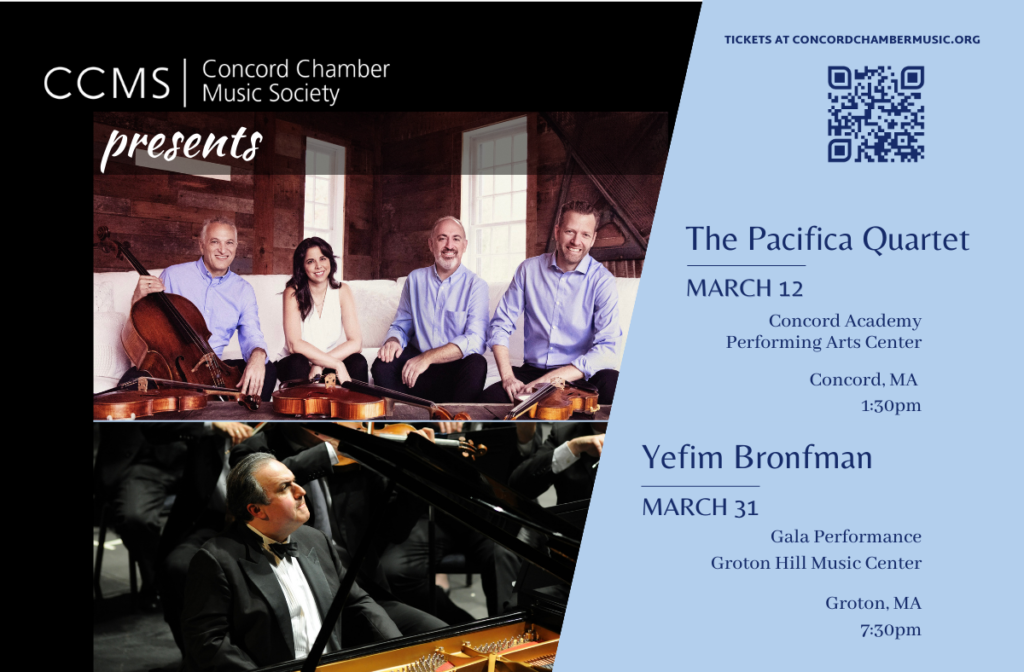March JAZZ Listening Project Playlist 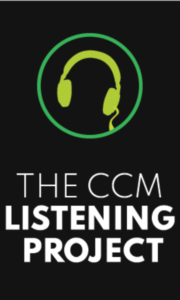
Since jazz contains an incredibly broad spectrum of music and ideas, CCM faculty member Stephen Marotto narrowed it down to provide an impressive jazz playlist to learn from and enjoy. His playlist captures the essence of jazz by giving you music by Herbie Hancock, Weather Report, Duke Ellington with John Coltrane, Miles Davis, and other notable jazz musicians.
Remember to use your Listening Journal for additional thought-provoking questions to think about while listening to the selections. It’s a great way to start insightful conversations with your family, friends, or music instructor!
What do Fidelity, Raytheon, and State Street have in common?
They have matching gift programs.
Won’t you please consider giving the gift of music today?
Are you a CCM friend yet?
Join us on Instagram and Facebook to be the first to learn CCM news and more! See what music videos we like, photos we post, practice tips and articles we suggest, and new music in the music world. Be sure to bookmark the CCM Blog to never miss a new post.
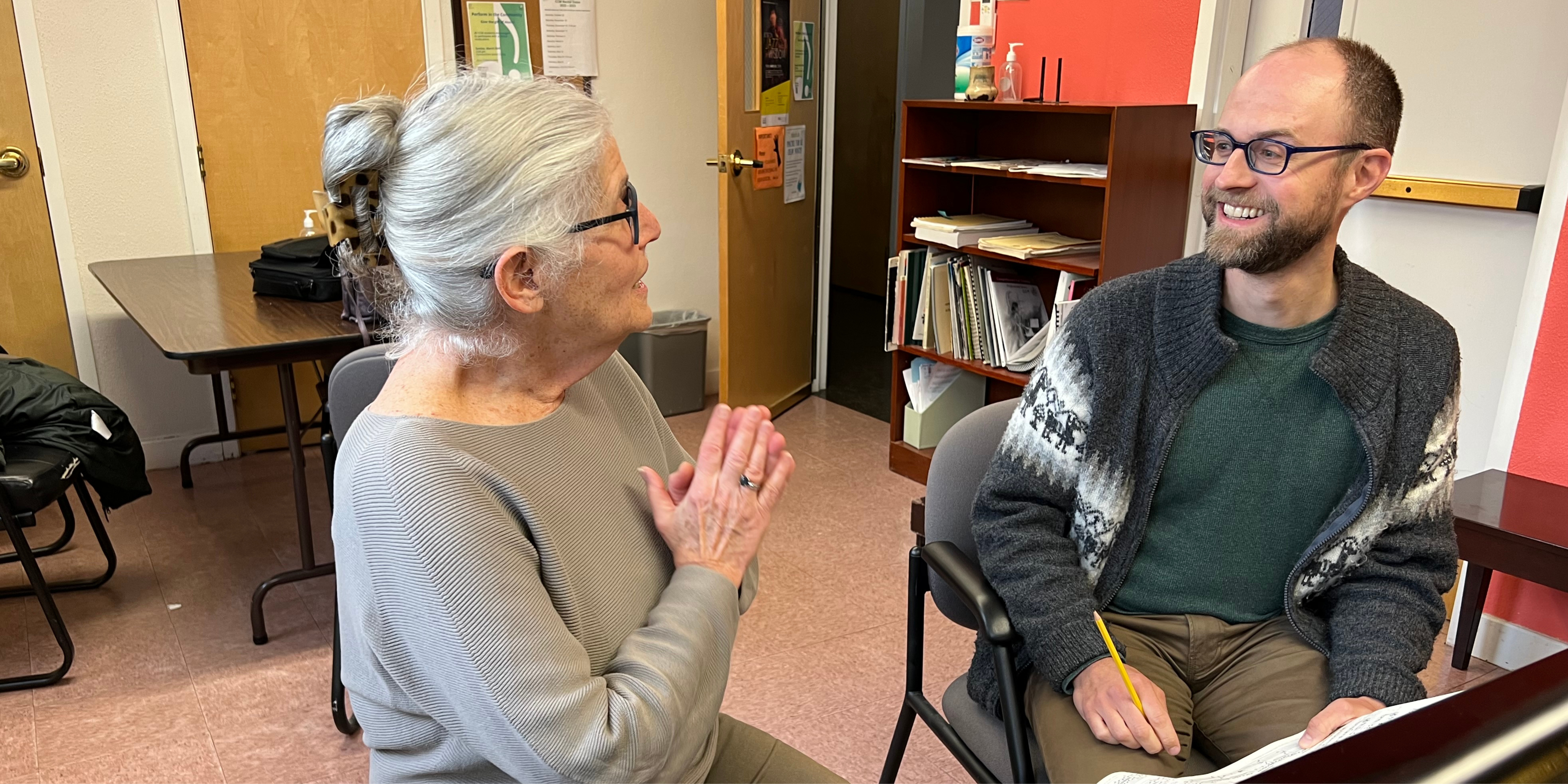
Keith Kirchoff knew from an early age that he wanted music to be a big part of his life. “I remember asking Santa for a piano at age three,” says Keith, who grew up in St. Cloud, Minnesota.
And while Santa didn’t grant Keith’s wish for a couple more years — “He used a big stocking,” Keith says — the future CCM Piano Department Chair proved that his interest was not just a toddler’s whim. Keith immersed himself in his lessons and became a proficient pianist by the time he reached middle school.
And then a funny thing happened. Keith discovered that in order to reach his full potential, he essentially had to stop playing and unlearn some bad habits. “I didn’t do any real repertoire for about a year,” he says.
Is There a Doctor in the House?
The radical change in Keith’s approach came about when he became a student of Dr. Paul Wirth — “one of the great piano pedagogues in the United States,” Keith says. “He completely rebuilt my technique and retrained me from the ground up.”
Dr. Wirth specializes in “an approach that develops maximum relaxation so that there’s no tension in your playing,” Keith says. “You really do get a sense of what your body is doing — which muscles are active when they should be, but also when they shouldn’t be.”
Besides enabling a freer, more fluid approach to performing, Dr. Wirth’s technique offers another crucial benefit — one that Keith now passes on to students at CCM: It reduces the chance of repetitive-motion injuries such as tendinitis and carpal tunnel syndrome. “Students can also can get a lot of shoulder or back tension if they’re not properly relaxed,” Keith says. “Music is in many ways an athletic activity. As in any sport, a solid technique helps prevent injury. It’s not uncommon for those who don’t have the proper technique and are practicing multiple hours a day to develop those injuries.”
Every Student Has a Different Starting Point 
As grateful as he was for Dr. Wirth’s mentorship — “I learned so much and I wouldn’t have wanted to do it any other way” — Keith says an approach that prioritizes nuances of technique over performance won’t necessarily work with everyone. “If you tried that with a student who wasn’t fully committed to playing piano, they would lose interest pretty quick,” he says. “So I try to strike a balance.”
The first step in getting a student to relax is to get to know them — including their interests outside of music. A teacher who cares about a student as a whole person is far more likely to earn that student’s trust. “And once they feel that they can trust you, they reach a certain comfort level in how they hold themselves during the lessons and how they communicate,” Keith says. “That’s builds the foundation for the proper technique.”
Also: Playing Piano Should Be a Pleasure
Keith is appropriately serious about his responsibilities as an instructor and piano department chair (as well as a performer who specializes in works that combine electro-acoustics with solo piano). But he also has an infectious enthusiasm for the simple joy of playing music. Just watch his performance on YouTube of a piece he commissioned, composed by Matthew McConnell, called “Toy Piano Concerto.” It’s hard to imagine a better demonstration of what’s possible when you learn to properly relax when playing.
Over the years Keith has introduced a number of programs to enhance CCM students’ enthusiasm and engagement:
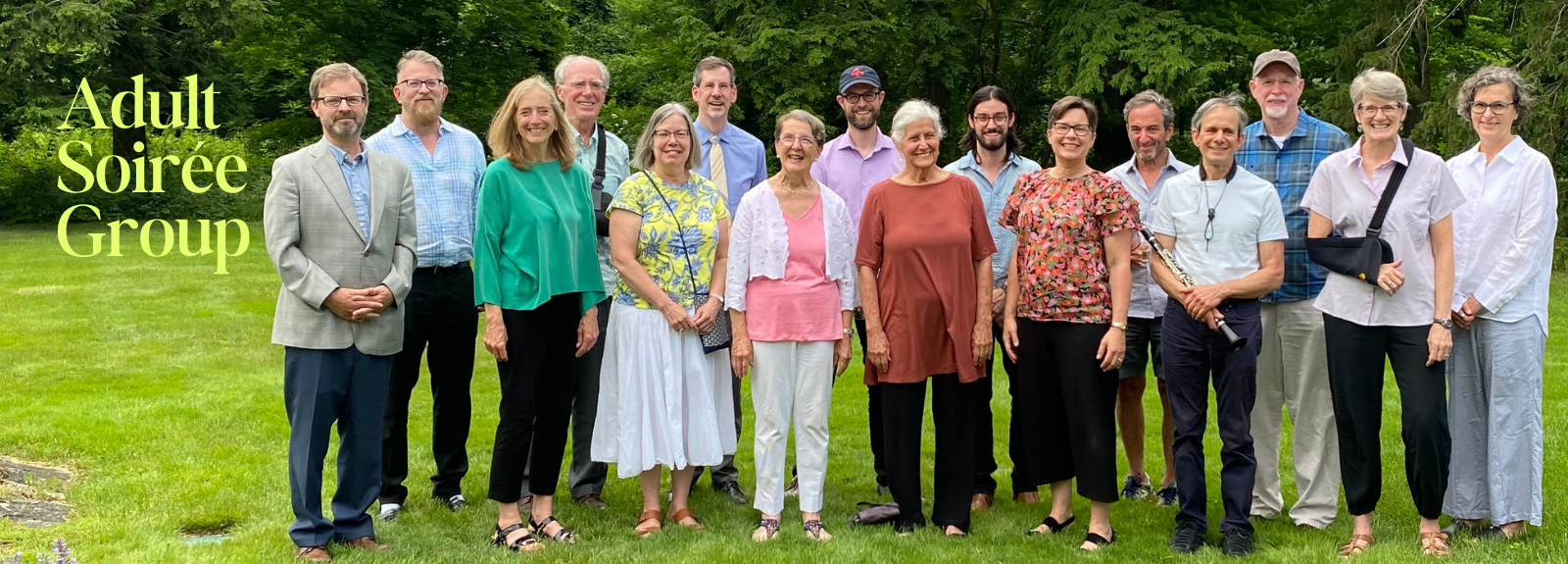
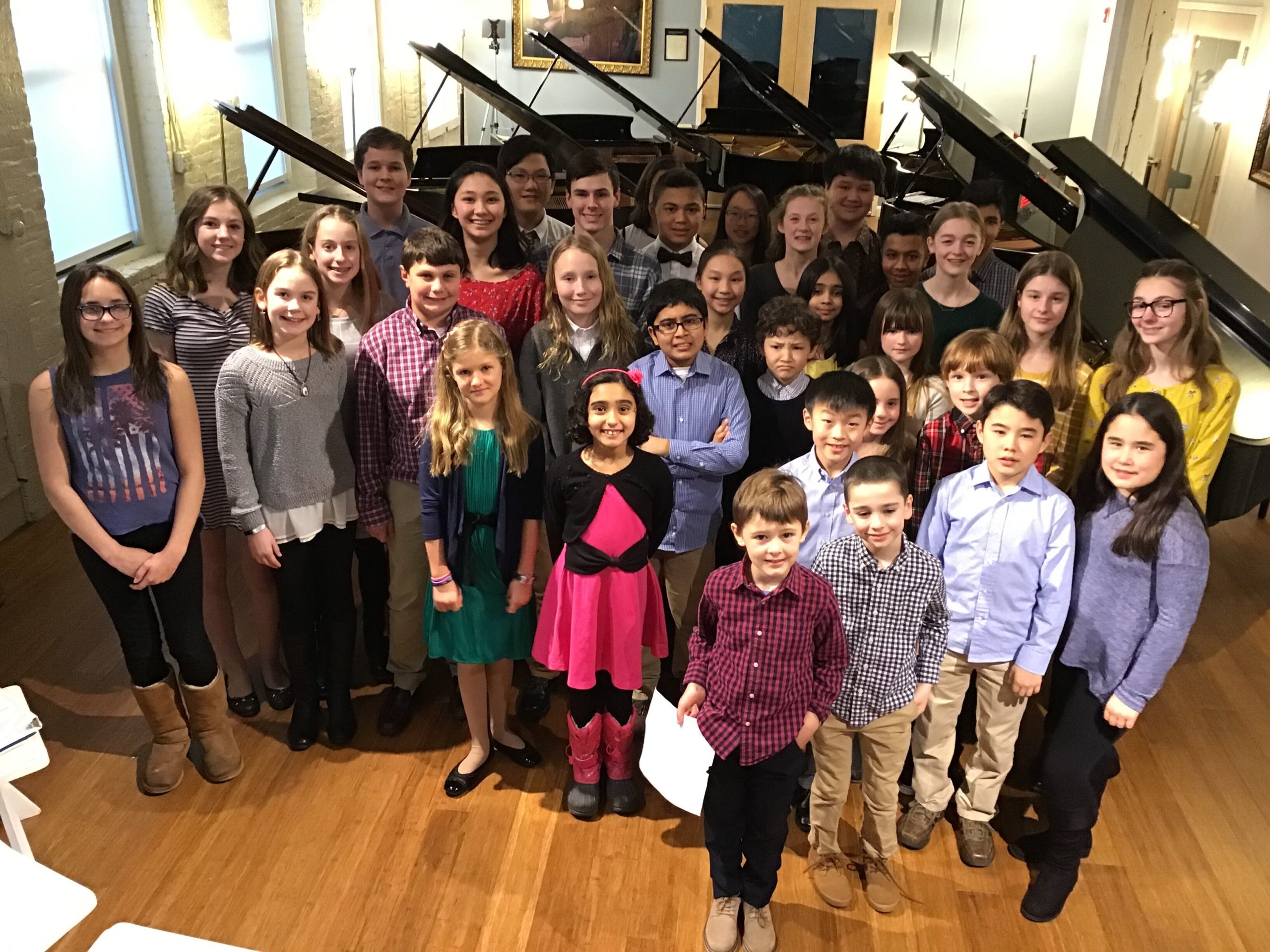 M. Steinert & Sons. “The idea was to bring piano players together in an ensemble situation,” Keith says. “As pianists we don’t get many opportunities to follow a conductor in a large ensemble very often. It was super fun, and Steinert was very generous with time, space, and pianos.”
M. Steinert & Sons. “The idea was to bring piano players together in an ensemble situation,” Keith says. “As pianists we don’t get many opportunities to follow a conductor in a large ensemble very often. It was super fun, and Steinert was very generous with time, space, and pianos.”And for the Grand Finale — Scalefest!
At the conclusion of each school year, many CCM piano students participate in Scalefest. It’s a demonstration of their proficiency in playing the scales they’ve learned not just that year but in prior years, along with their grasp of various theory concepts. Students’ progress is judged using five criteria: 1) how well they know the scales; 2) how accurately they play the scales; 3) their physical posture when playing the scales; 4) how well they maintain a steady tempo; and 5) whether they use the proper fingering. “Scalefest helps us determine how well a student retained those lessons during the year,” Keith says, “as well as what their starting point should be for the following year.”
Uh, with all due respect, Scalefest kinda sounds like a final exam.
“It is,” Keith says with a laugh. “But I think ‘Scalefest’ sounds better.”
And for a musician, sounding better should always be the goal.
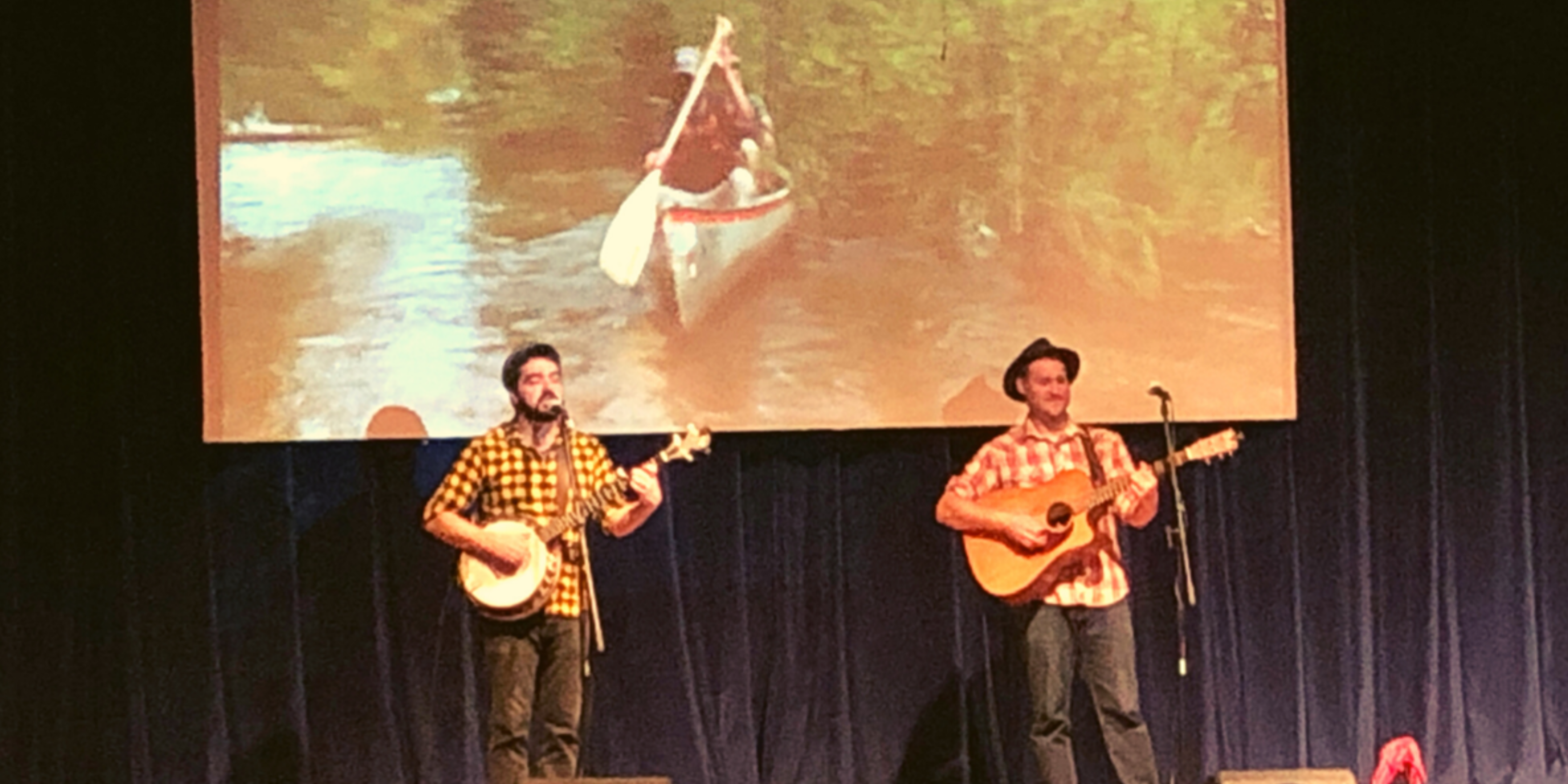
What makes kids’ songs so catchy?
It’s those musical hooks that grab our attention and create songs that get sung by every generation. Think The Wheels on the Bus, Happy and You Know It, and even the more recent kid hit, Let It Go, from the movie Frozen. We all know those tunes well, whether you want to or not. With catchy lyrics, happy melodies, and engaging rhythms, these songs get stuck in our heads, and kids never seem to tire of them.
Hooks are present in all genres. As the founder of Hello Music Theory and music teacher, Dan Farrant points out, “A classic hook that has stood the test of time is the opening few bars of Wolfgang Amadeus Mozart’s Eine Kleine Nachtmusik.”
He continues, “Something about a song has hooked you and elicited a visceral response. You just can’t stop yourself from humming or whistling the tune. If your foot starts tapping and your body starts swaying to some primordial beat, it almost feels like you are out of control.” This type of response applies to kids too. The song’s hook gets kids bopping around, clapping their hands, thoroughly enjoying the music, and having fun.
Kid’s Music: the ideal teaching tool
For toddlers through elementary school, music written and geared for kids helps with language, communication, and cognitive skills. Even songs that grate on our nerves with annoying repetition provide some educational value.
As New York Times writer Paul L. Underwood says, “Baby Shark is torture.”
If you’ve heard it, you know what he means. It’s extremely repetitive, with silly lyrics and lots of doo-doo, doo-doo. But it does capture kids’ attention and gets them singing.
Underwood continues, “Kid-friendly tunes tend to be upbeat and catchy. There’s usually some degree of adaptability, where a kid can suggest a new animal sound during “Old MacDonald Had a Farm.” Repetition is key, which will come as no surprise to any parent who has sung endless versions of “The Itsy Bitsy Spider” or contributed to the billions of “Baby Shark” views on YouTube. Finally, the songs tend to be about relatable, familiar topics.”
Songs like Raffi’s Baby Beluga or Rick Charette’s Alligator in the Elevator get kids singing and clapping along—learning lyrics, rhythms, and melodies. Songs with attention-grabbing, memorable hooks can teach more than music. Educational lyrics about math and science can be impactful to young minds—with Sesame Street leading the way with songs that teach academic subjects.
How can parents take the music their kids love to sing and bop around to, and spark their learning?
Live musical performances hook kids into loving music!
What do children receive when they watch great artists perform live, beyond the recordings you listen to with them at home or in the car?
Kids gain enormous benefits when parents create those special childhood memories of taking them to live performances. From learning concert etiquette and sitting quietly in their seats to clapping along to music when encouraged, kids get exposed to music outside of their homes. Live music can boost creativity and improve focus, listening skills, and attentiveness.
Live music is also social—connecting kids to family members, friends, and their community.
Kids visualize how the music they love is made, and the joy with which it is made. They see the musicians’ skills that they can work towards having one day. They participate in the creation of art. As violin instructor Eloise Hellyer writes, “Children attending a live concert learn what it means to be on the receiving end of the music as it is performed and, as part of a present and participating audience, that they provide feedback to the musician.”
Beyond private instruction, we’ve made it our mission to offer fun and engaging group classes to kids. By mixing fun and lively music with movement, young kids learn the basic components of music without even realizing it. CCM group classes, such as Family Notes, Music Makers, Tones of Fun Developmental Music Class for kids with developmental needs, and others, can start kids on their musical journey. That is our hook!
But there is more to do to get kids enchanted with music. Give your children the unforgettable and outstanding experience of live music created specifically for them. We’re helping to do just that by bringing Grammy and five-time Parents’ Choice Award winners, The Okee Dokee Brothers, to our local area.
The Grammy-winning Okee Dokee Brothers’ Hook: Getting kids to learn, appreciate, and love music and nature
What’s the hook for an Okee Dokee Brothers song?
Their hooks are about their passion for the outdoors (i.e., Can you Canoe?, Through the Woods, Campin’, Blankets of Snow).
The Brothers want everyone to step outside, get creative, and motivate kids to gain a greater respect for nature. By doing this, kids will inevitably gain respect for themselves and their communities. Beyond the educational value a young child receives by attending an Okee Dokee Brothers live concert, they’re guaranteed to have a fantastic time.
Bring your entire family and join us for one show only on Saturday, April 1st, held at the Acton Boxborough High School. Create terrific memories for your entire family!
Purchase tickets in advance ($25 General Admission)
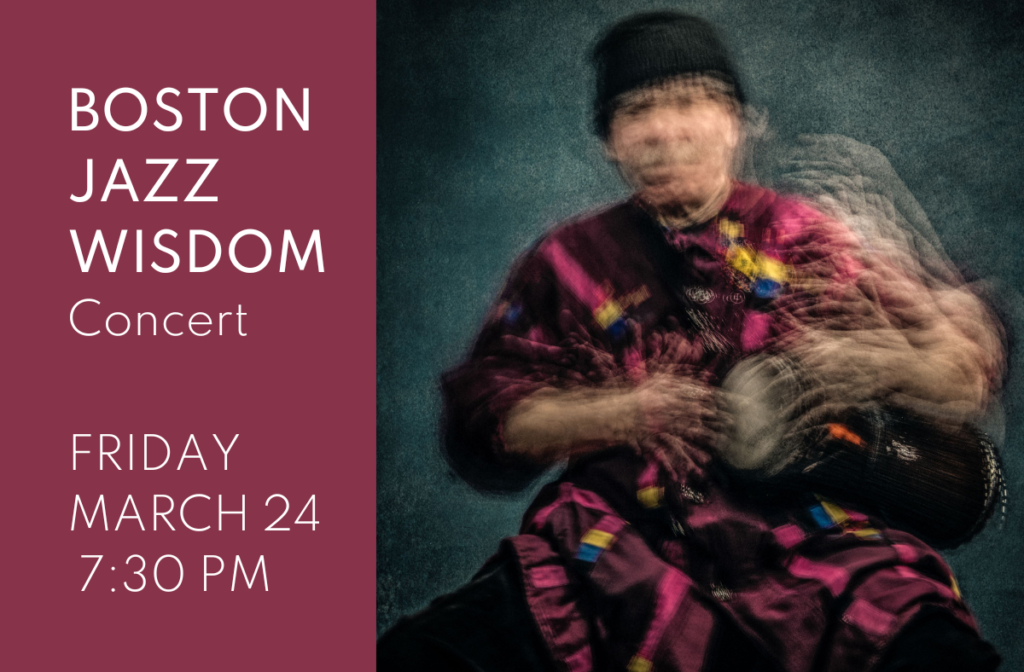
Join us when the CCM presents Boston Jazz Wisdom on Friday, March 24th, at 7:30 pm.
Experience live music with an evening of energetic, free-spirited, and innovative jazz led by jazz percussion legend Ra-Kalam Bob Moses. His colorful and multicultural music knows no boundaries. The all-star jazz line-up features Dave Bryant on piano, John Lockwood on bass, and CCM faculty member Tsuyoshi Honjo on saxophone.
Ra Kalam Bob Moses is one of the world’s great musicians, composers, and drummers. As an adventurous drummer and composer, Bob Moses has played with an amazing list of stellar musicians, including Dave Liebman, Pat Metheny, Herbie Hancock, Bobby McFerrin, Dave Sanborn, Gary Burton, and many more over his career.
Purchase Tickets in advance or payable at the door for this event. ($25 General Admission and free for students 18 and under)
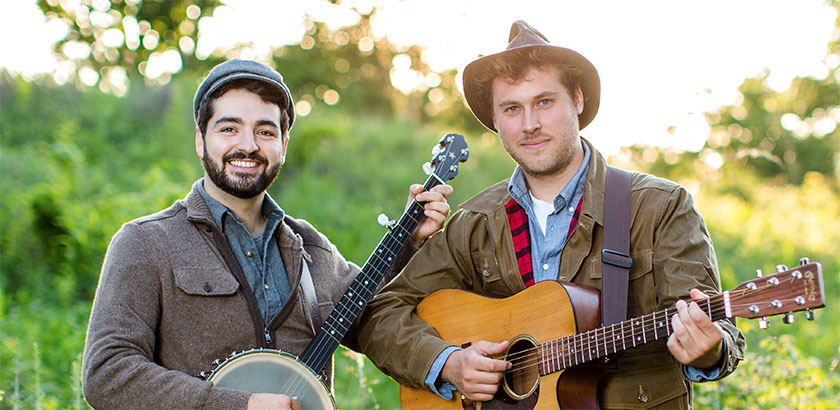
The Okee Dokee Brothers Family Concert
Saturday, April 1 at 2:00 pm
GRAMMY Award-winning Okee Dokee Brothers return to the Boston area for one show only, bringing their new album “Brambletown” and all their fan-favorite songs for singing and dancing. Get tickets today to see the infectious musical duo at the Acton-Boxborough High School.
The Okee Dokee Brothers draw creativity from their incredible extensive outdoor experiences. With humor and heartfelt connections to nature, their songs teach and entertain audiences of all ages. The Minnesota Parent Magazine says, “The Okee Dokee Brothers are an absolute national treasure. These songs are just what the world needs right now.” If you want to introduce your kids to great music with lyrics that embrace adventure and finding happiness, look no further than The Okee Dokee Brothers.
Purchase Tickets in advance or payable at the door for this event. ($25 General Admission, Free for babies one-year old and younger held in an adult’s lap). This concert will be held at the Acton Boxborough Regional High School, 36 Charter Road in Acton.
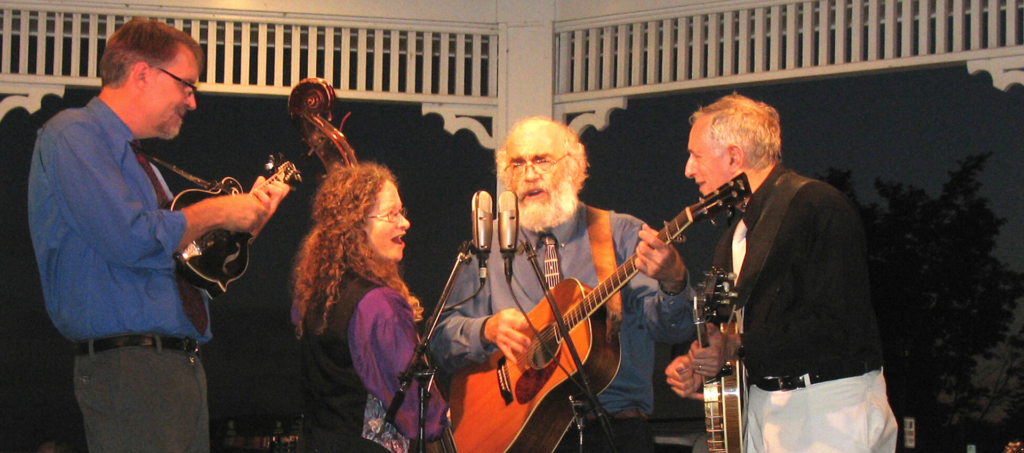
Southern Rail, a bluegrass concert
Saturday, April 29 at 7:00 pm
Southern Rail’s performances are high-energy exuberant fun, with riveting harmonies, irrepressible humor, and sparkling banjo, mandolin, and guitar solo work.
Southern Rail celebrates more than four decades of performing together. CCM faculty member Rich Stillman (banjo and harmony vocals, Jim Muller (guitar and lead vocals), Sharon Horovitch (acoustic bass and harmony vocals), and John Tibert (mandolin and harmony vocals) give us rich vocals on beautiful and creative bluegrass arrangements.
Purchase Tickets in advance or payable at the door for this event. ($25 General Admission and free for students 18 and under)
The Concord Cultural Council, a local agency supported by the state agency Mass Cultural Council,  generously granted funding toward the 2022-2023 CCM Concert & Lecture Series.
generously granted funding toward the 2022-2023 CCM Concert & Lecture Series.
Additional performances in our community
We’re excited to share with you two upcoming performances presented by the Concord Chamber Music Society.
